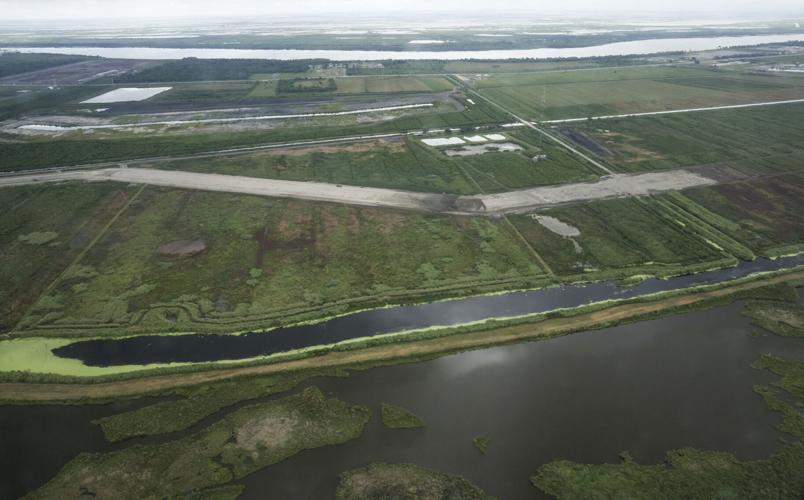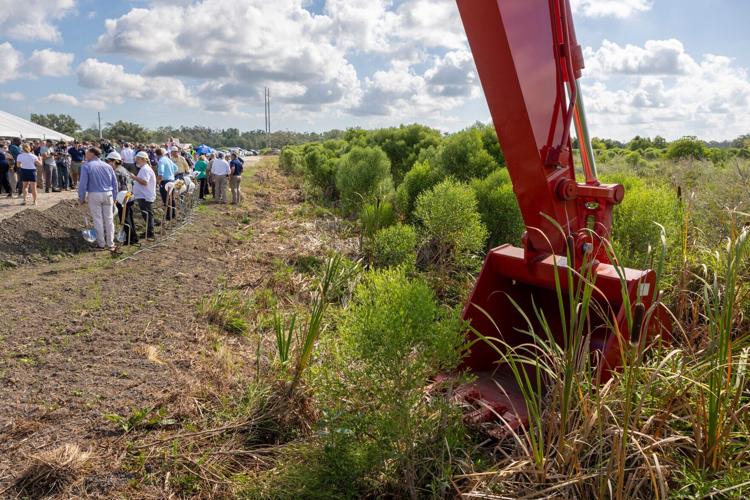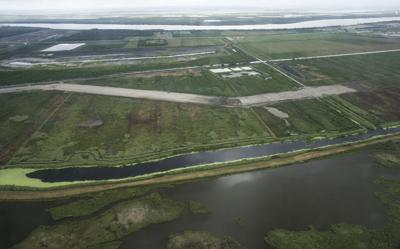Louisiana must commit to an unprecedented $3 billion coastal restoration project that's been in limbo for months or return the money intended to pay for it, federal officials recently warned in a strongly worded letter.
The letter regarding the Mid-Barataria Sediment Diversion puts further pressure on Gov. Jeff Landry's administration to move forward with the project, which broke ground in August 2023 after years of planning and scientific evaluation. Landry, a staunch conservative, has left the diversion's future in question since he took office in January, engaging in negotiations with project opponents who have filed suit and want to see it reduced in size or canceled outright.
The project is being paid for with funds linked to the 2010 BP oil spill through a process overseen by federal and state officials. Federal trustees overseeing the money sent the letter, dated Oct. 18, to the executive director of the state's coastal authority, Glenn Ledet, requesting a "clear statement" that Louisiana remains dedicated to building the diversion as previously evaluated and approved.
The warning raises the specter that state taxpayers -- already facing a potentially severe deficit next year -- could have to repay around $500 million in funds already spent on the project. The threat of lawsuits by contractors also looms should the state back out of building it.
The letter also warns that opting for another design would result in delays and further cost increases. The project has been the subject of lengthy study by the Army Corps of Engineers, which has issued a permit for its construction, as well as other agencies.
"If Louisiana decides not to pursue the project as evaluated and designed, the federal trustees expect that the state will cease spending allocated TIG funds immediately and return those funds for future restoration activities," the missive says, referring to the oversight body known as the Trustee Implementation Group. "Given the gravity of this situation, we cannot overstate the importance of continued transparent communication with the Louisiana TIG Trustees and with the affected public."

Map of the Mid-Barataria sediment diversion project.
It adds that "no other single restoration project has been planned and studied as extensively over the past decades."
The communication was signed by Biden administration officials from the departments of Interior and Agriculture as well as the Environmental Protection Agency and National Oceanic and Atmospheric Administration. The state's Coastal Protection and Restoration Authority did not respond late Monday to a request for comment.
Pointed questions from legislators
The project is controversial largely because of the impact it will have on commercial fishing on the west bank of Plaquemines Parish. The diversion will funnel fresh water and sediment into the Barataria Basin to restore lost wetlands as the state faces a worsening land loss crisis, but it will force shrimp and oyster fishers in the area to move elsewhere or find new lines of work.
The plan includes $378 million to assist those impacted by the project. Commercial fishers, however, say that's not nearly enough and have mounted a campaign against the project, with Lt. Gov. Billy Nungesser, a former Plaquemines Parish president, among those advancing their arguments.
The diversion has been seen as a linchpin of the state's coastal program not only because of the land it would build, but also because of how it would work. It is designed to mimic the natural processes that built south Louisiana in the first place, working with nature instead of against it, while also helping nourish other land-building projects in the area.
If completed, the diversion would funnel up to 75,000 cubic feet per second of water and sediment from the Mississippi River into the basin, but that number would be adjusted seasonally depending on river flows. It is expected to build around 20 square miles of land over 50 years.

Public officials, staff with the Coastal Protection and Restoration Authority and coastal rebuilding advocates gather for a Mid-Barataria Sediment Diversion groundbreaking ceremony near Ironton on Thursday, August 10, 2023. On Tuesday, July 23, 2024, economist Loren Scott released a report outlining billions of dollars in sales revenue, millions of dollars in local taxes and hundreds of jobs that will be created during the project's five-year construction period. (Photo by Chris Granger | The Times-Picayune | NOLA.com)
Democratic Gov. John Bel Edwards' administration strongly advocated for the project, but Landry and his appointees to the coastal authority have been far less enthusiastic. Landry and Nungesser discussed the diversion in a meeting in February 2023. Nungesser says Landry told him he would look at the project with an open mind.
In a sometimes tense state Senate committee hearing earlier this month, lawmakers pointedly questioned the chair of the state's Coastal Protection and Restoration Authority, Gordon Dove, over the stalled project, asking whether politics was playing a role in its delay. Dove defended the agency's position, saying it had to respond to the concerns of Plaquemines Parish.
But in doing so, the state has appeared to abandon a previous legal position that it did not need a construction permit from the parish for such a project. Plaquemines has refused to issue a permit and filed suit over it in state court, leading to the current negotiations. Dove has said all options are open for the state.
Negotiations have so far reached an interim deal where certain preliminary work on the project can continue, but there is no agreement in place for the wider scope of the plan.
'A continuous stall tactic'
State Rep. Joseph Orgeron, R-Golden Meadow, is among lawmakers raising concerns over the delay, and he sent a letter to colleagues expressing what he sees as the urgent need to build the project. In an interview, Orgeron said discussions over the operation of the diversion were legitimate, but redesigning it should be out of bounds.
"I see a redesign as a continuous stall tactic, or maybe a 'it'll never get built' tactic," said Orgeron, who represents parts of Jefferson and Lafourche parishes that have seen major land loss.
The Restore the Mississippi River Delta coalition of environmental organizations said in a statement it was "heartened that the federal funding agencies have reminded the state of the obligations it has to complete the project and deliver the benefits it promises to the people of Louisiana."
"Our sincere hope is that this action by the federal trustees helps get this incredibly important project – which is supported by a majority of Plaquemines Parish residents – back on track," it said.
The Coalition to Restore Coastal Louisiana, which has worked on land loss issues for decades, spoke recently of the need to build the project as designed.
"Building a scaled-back version of the Mid-Barataria Sediment Diversion would be like Chief Brody from 'Jaws' telling his colleague, 'you’re gonna need a smaller boat,'" Kim Reyher, the organization's executive director, said in a statement. "We’d get all the adverse impacts but none of the positive ones. Our coastal parishes would continue losing land at a rapid rate."
Staff Writer Mark Schleifstein contributed to this report.
Editor's note: This story was updated on Oct. 22 with a statement from the Restore the Mississippi River Delta coalition.





